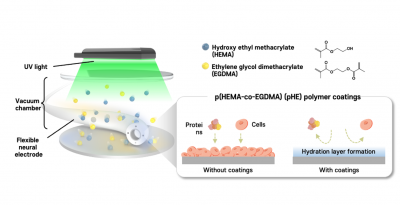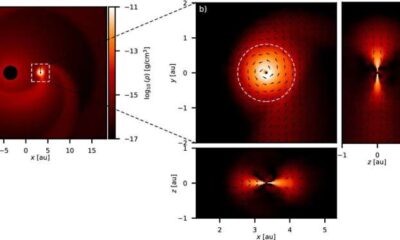Science
Innovative Coating Boosts Brain Electrode Longevity to Over 3 Months

A research team led by Dr. Hyejeong Seong at the Korea Institute of Science and Technology (KIST) has developed a groundbreaking coating technology that significantly extends the lifespan of implanted electrodes. Previously, these electrodes could record brain signals for only one month, but this new advancement increases their durability to over three months. This remarkable progress was achieved in collaboration with Prof. Seongjun Park from Seoul National University.
The extended duration of signal recording is crucial for various applications in neuroscience and medical research. The ability to monitor brain activity for longer periods can enhance the understanding of neurological disorders and improve the development of treatments. This innovation addresses a significant limitation in current brain-computer interface technologies, which often face challenges due to the degradation of electrodes over time.
The research, published on October 10, 2023, outlines the use of a specialized coating that protects the electrodes from biological degradation. This barrier allows for more reliable data collection from the brain, facilitating long-term studies and potentially leading to improved patient outcomes. The findings were shared in a prominent scientific journal, highlighting the collaboration’s significance in advancing neurotechnology.
Dr. Seong emphasized the importance of this development, stating, “With this new technology, we can maintain a stable connection with the brain for a longer time, which is essential for both clinical and research purposes.” The potential applications of this technology are vast, ranging from improved treatments for epilepsy to advanced prosthetics that respond directly to brain activity.
In addition to enhancing electrode longevity, the research team aims to explore the coating’s compatibility with various electrode materials. This could open avenues for customization in brain interfaces, tailoring them to individual patient needs. The team is optimistic that ongoing research will further refine the technology and expand its applications in neuroscience.
These advancements not only represent a technological leap but also highlight the growing collaboration between institutions in South Korea. The leadership of both KIST and Seoul National University under the direction of Sang-Rok Oh and Hong-Lim Ryu, respectively, has fostered an environment conducive to innovation. This partnership exemplifies how academic institutions can work together to address complex scientific challenges.
As the field of neurotechnology continues to evolve, this new coating technology stands out as a promising breakthrough. By enhancing the durability of brain electrodes, researchers can conduct more extensive studies and potentially unlock new treatments for neurological conditions. The implications of this work could reshape the future of brain-computer interfaces and their applications in medicine and beyond.
-

 Health2 months ago
Health2 months agoNew Gel Offers Hope for Regrowing Tooth Enamel in Dentistry
-

 Science2 months ago
Science2 months agoUniversity of Hawaiʻi at Mānoa Joins $25.6M AI Initiative for Disaster Monitoring
-

 Science1 month ago
Science1 month agoALMA Discovers Companion Orbiting Red Giant Star π 1 Gruis
-

 Lifestyle1 month ago
Lifestyle1 month agoPark Jung Min’s Endearing Moment with Hwasa Steals Show at Awards
-

 Science2 months ago
Science2 months agoIROS 2025 to Showcase Cutting-Edge Robotics Innovations in China
-

 Lifestyle2 months ago
Lifestyle2 months agoStone Island’s Logo Worn by Extremists Sparks Brand Dilemma
-

 Lifestyle2 months ago
Lifestyle2 months agoSampson County Celebrates Susie Faison’s 100th Birthday Milestone
-

 Lifestyle2 months ago
Lifestyle2 months agoMary Morgan Jackson Crowned Little Miss National Peanut Festival 2025
-

 Health2 months ago
Health2 months agoStartup Liberate Bio Secures $31 Million for Next-Gen Therapies
-

 Health2 months ago
Health2 months agoTop Hyaluronic Acid Serums for Radiant Skin in 2025
-

 Politics2 months ago
Politics2 months agoJudge Considers Dismissal of Chelsea Housing Case Citing AI Flaws
-

 Science2 months ago
Science2 months agoArizona State University Transforms Programming Education Approach









